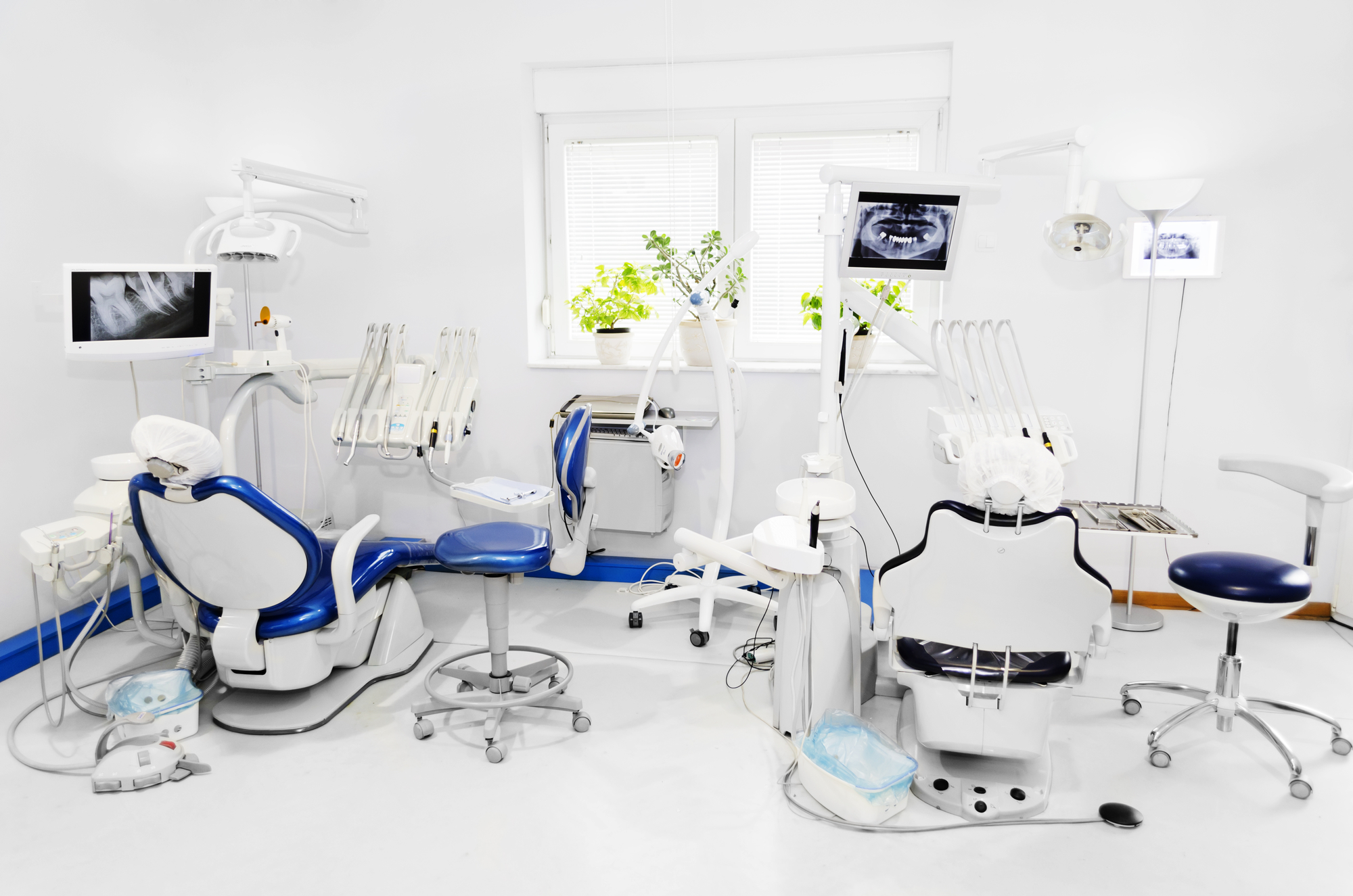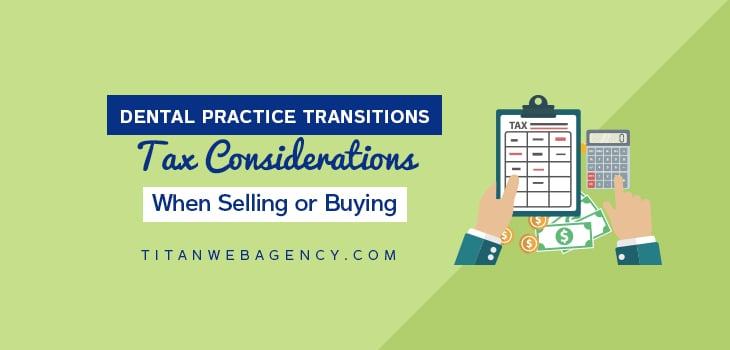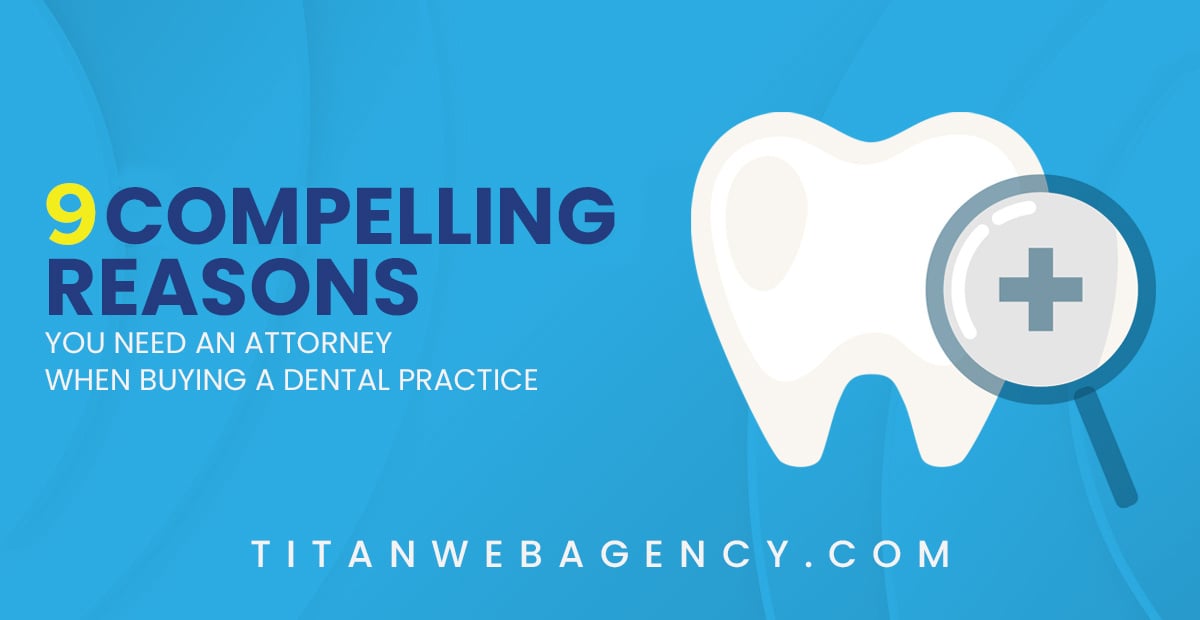Buying or selling a dental practice can be a complicated and stressful endeavor. In addition to negotiating a fair price and coping with the legal ramifications of the dental practice transition, you also need to be thinking about how the sale will impact your taxes.
The issue of minimizing taxes is one that’s important to me – and something I help my clients with every day. The United States tax code is complicated and that can make it difficult for anybody to navigate. If you’re planning on buying or selling a dental practice, you need to understand how the decisions you make during the sale will affect your taxes. Here are some things that can help.
Tax Fundamentals for Sellers
If you’re the one selling a practice, then you need to understand how the proceeds of the sale will be taxed. That depends upon how you organized your practice in the first place.
For example, if your practice is a C corporation, and if you sell the assets of the corporation all proceeds of the sale will be taxed on a corporate level. This means you will pay tax at the corporate level, and when you distribute the money to your personal accounts, you will be taxed again. If you sell the stock of a C corporation, then the proceeds from the sale, less your basis in the stock in the corporation, are capital gains.
On the other hand, if your practice is a sole proprietorship, regular partnership (such as a limited liability company or a limited liability partnership), or an S Corporation, you may pay tax on both ordinary and/or capital gains income on your personal income tax return based on the structure of the sale. An asset sale is more beneficial to the purchaser, so most transactions are based on an asset sale. If you’re retiring from dentistry, it’s important to understand how your practice’s entity type and the structure of the sale can impact your tax obligations.
Maximizing the Value of Your Practice
Planning to sell your practice is something you should plan for. In the years leading up to the sale, there are common-sense things you can do that will, when the time comes, add to the
value of your practice and help increase the sales price.
First, increase your prices annually. A lot of dentists are reluctant to raise prices because they fear that they’ll lose patients as a result. However, provided that you raise your prices in a reasonable way, it’s unlikely that your patients will mind. They understand that you need to earn a living, too.
Raising prices helps increase the value of your business by increasing your profits. It may also help you attract more potential buyers. A new buyer is likely to be wary of increasing prices right after buying your practice. Raising prices on an annual basis will help them see the value of your practice in a concrete way.
Second, it’s a good idea to do what you can to minimize your overhead expenses. Every business should review overhead expenses regularly. That means reviewing your supply costs, labor costs, and personal expenses. You should compare your overhead to other practices in your area to make sure that you’re not spending too much.
Other ways to maximize the value of your practice include:
- Spending more money on marketing to attract new patients
- Setting up a referral program
- Upgrade your equipment
- Make physical improvements to your office
These things can all add value to your practice. However, there is one additional, non-tangible asset that you should be thinking about: the goodwill and reputation of your practice. You can add to its value by providing the best possible service to your patients and being an active member of your community.
Depreciation for Sellers
You already know that your dental practice, while it may appear to be a single entity, is not taxed that way. As part of your practice, you own various kinds of assets – things like dental supplies, dental equipment, real property, and the goodwill and reputation you have accumulated over the years. For the sale, you must use the correct accounting and tax rules. That includes understanding when and how to depreciate each asset of your practice.
The way you allocate the sale price for the buyer – and how that cost depreciates – will have a big impact on both your taxes and the buyer’s taxes. As a seller, you want to maximize the goodwill value of your practice. Here’s a general guideline to tax depreciation and amortization, which may be useful to both buyers and sellers:

- Office supplies – one-year deduction
- Dental equipment – seven years depreciation
- Real property – thirty-nine years depreciation
- Practice goodwill – fifteen-year amortization
- Patient records – fifteen years amortization
- Non-compete clause or agreement – fifteen-year amortization
Your office supplies, dental equipment, and non-compete clause are likely taxed as ordinary income. On the other hand, your real property, practice goodwill, and patient records are taxed as long-term capital gains. It’s in your best interest as the seller to put as much of the value of your practice into assets that will be taxed as long-term capital gains.
In most cases, the majority of a practice’s value is the practice's goodwill. There’s a good reason for that. Office supplies and dental equipment can and will be replaced. Your reputation and the goodwill you’ve acquired with your patients can’t be replaced and will be the basis of ongoing income for the buyer. In practical terms, the capital gains tax rate – which will apply to the goodwill of your practice – is lower than the ordinary income tax rate.
Depreciation for Buyers
If you’re the one buying a dental practice, you must pay careful attention to how the assets are allocated. The same depreciation schedule I included above will apply, but you’ll need to look at it from the other side. That’s because you’ll be recovering the cost of the assets you purchased based on how they are allocated.
It’s in your best interest to allocate as much of the sale price to items that can be recovered quickly, such as dental equipment and supplies. Depending on the individual circumstances of the sale, you may be able to expense most of the cost of the equipment you purchased in the first year after you purchase the practice. However, you’ll still need to use the proper depreciation schedule when filing and paying your taxes. While accountants handle tax and depreciation strategies, an attorney ensures the purchase agreement reflects asset allocations to protect your interests and prevent future disputes.
For more insights, check out our blog on 9 Compelling Reasons You Need an Attorney When Buying a Dental Practice.
The one thing that you will not be able to change is the amortization of the goodwill you’re buying when you purchase a dental practice. That is legally required to be amortized over 15 years. Therefore, it’s in your best interest as a buyer to put as much of the value into ordinary assets as possible.
Of course, that goal will put you at odds with the seller, who has the opposite goal. You’ll need to negotiate to come to an agreement that is equitable.
Contract Considerations for Buyers and Sellers.
The tax considerations of buying or selling a dental practice are only one part of the transition. Any decisions you make about the allocation of the sale price to the various assets that are involved in the purchase must be reflected in the final purchase contract.
The key thing to keep in mind when drafting the contract is that you will need to lay out the allocations that you have negotiated. During negotiations, your focus may be on arriving at an agreement that feels fair and reasonable to both parties. That’s as it should be, but there is one other consideration to keep in mind.
The way you allocate the assets must be something that you can present to the IRS as a fair representation of market values. Let’s look at some examples of how that might affect your negotiations.
As a seller, you want to minimize the value of equipment and inventory, since those are taxed as ordinary income. You might choose to sell some of your equipment at a lower price. However, you can’t go too far below the fair market value of the equipment without raising red flags. You’ll need to weigh the tax considerations up front against the potential hassle with the IRS if you lower the price of your assets too much.
On the buyer’s side, the goal is to accelerate your tax deductions on the purchase. However, paying too little for a major asset, like the goodwill of the practice, can also cause problems for you with the Internal Revenue Service. You must be able to justify the price you paid for each asset of the practice.
It’s the push and pull between the buyer’s and the seller’s best interests that will make the difference in your final tax burden, regardless of which side of the sale you’re on.
Financing Considerations for Buyers and Sellers
So far, we’ve been talking about sales as if they were one-time purchases, with all transactions occurring in the year of the sale. However, that’s not the only option – and there may be some real benefits to getting creative with your financing as part of the sale.
As a buyer, you may choose to use a combination of personal savings and a loan from a bank or other lender to purchase the practice in question. If you elect this option, you’ll be paying the seller the full purchase price at the closing, in much the same way you would if you were purchasing a home.
There is another option – and it may be beneficial to both the buyer and the seller from a tax perspective. In some cases, the seller may choose to finance the sale on behalf of the buyer. Instead of a mortgage, you’d be making payments to the seller over time.

An arrangement like this one benefits both parties when it comes to taxes. If you’re the seller, you’ll be able to pay the taxes on the sale over time as you receive monthly payments from the buyer. That reduces your tax burden in the year of the sale and allows you to even out your cash flow and income from the sale. There can be potential pitfalls and ordinary income recapture, so make sure you consult your CPA.
For the buyer, this arrangement also has some benefits. Financing with the seller means that you won’t need to negotiate a loan with a bank or lender. You’ll need to come to an arrangement that suits both of you, but it’s something that may be worth considering as you negotiate the terms of the sale. If you decide to use this option, it’s a must to have a financial professional help you negotiate. You’ll also want a lawyer to review the purchase agreement before you sign on the dotted line.
Hire an Accountant to Help You with the Negotiation
Negotiating the sale of a dental practice is a complicated endeavor. It requires a thorough knowledge of the tax code and an understanding of how to structure the assets appropriately. Improper allocation of the assets is something that can get you into trouble with the Internal Revenue Service.
You could try to negotiate the sale yourself, but I recommend against it. Whether you’re the buyer or the seller, you need to have a professional involved to ensure that your best interests are being represented. After all, the decisions you make during the negotiations will impact you for many years, whichever end of the transaction you’re on.
The best possible representative is a dental CPA who has experience negotiating dental practice sales and a comprehensive understanding of the tax code. A good accountant will be able to help you with everything from asset allocation to financing, to minimize your tax burden and maximize your profits.
Conclusion
Buying or selling a dental practice requires a complete understanding of the various assets being sold and the ability to negotiate a favorable price that will minimize your tax burden. For the seller, the goal is to maximize the value of the goodwill being sold, and for the buyer, it’s to maximize tax deductions in the year of the sale. Although these are conflicting goals, it is possible to reach an arrangement that’s fair to everybody while still minimizing your taxes and keeping you on good terms with the IRS.
Recommended Reading
- The Ultimate Guide to Buying a Dental Practice
- Starting a Dental Practice: A Complete Step-by-Step Guide
- Dental Practice Transitions: A Guide for Successful Dental Office Transitions
- Dental Office Names: How to Name Your Dental Practice
- Rebranding Dental Your Practice? 7 Things You Need to Know Before You Do
- Dental Practice Valuation: A Guide for Dentists
- Relocating Your Dental Practice? Here's Your Step-by-Step Plan [Free Checklist]
- Dental CPA: Why Hire a Dental Accountant For Your Business?
















